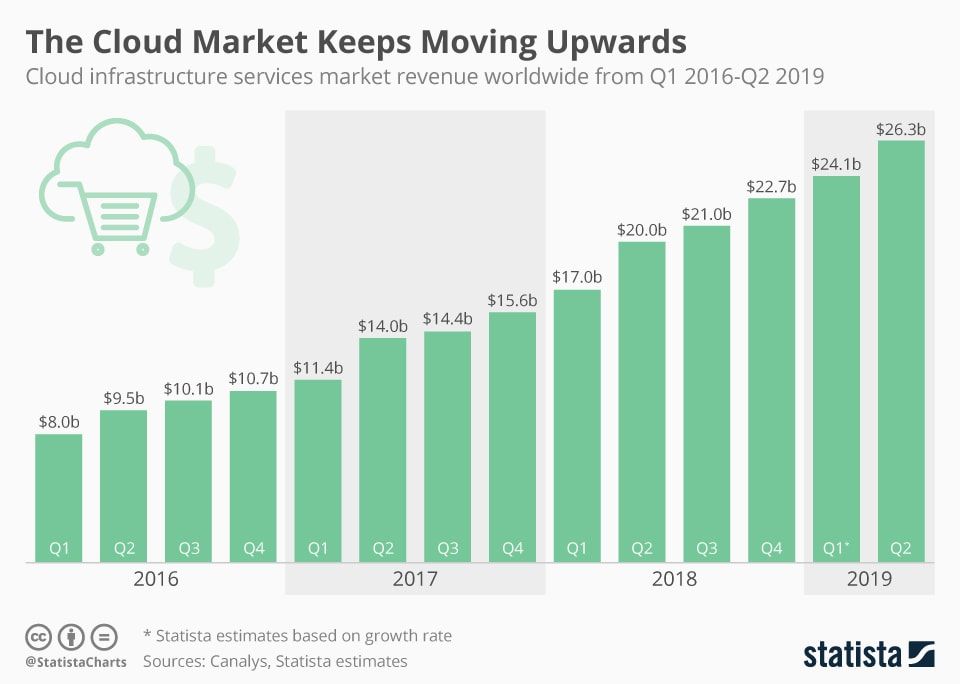Businesses today rely on data for nearly every decision that they make, and this trend is only going to continue into the future. However, data comes at a cost, whether it is in terms of storage space, processing speed, security, or resourcing. Many businesses have embraced public cloud solutions to address these needs, but while this solves some of the issues, it does not address them all. This is where private cloud solutions come into the picture.
What is a Private Cloud?
Private cloud solutions refer to private networks or servers that are dedicated exclusively for use by an organization. While the servers in a private cloud could be located in a shared data center, the individual servers themselves are dedicated solely to the organization, meaning access is limited and secure.
Private clouds, also called internal or corporate clouds, copy many of the advantages public ones offer business owners, like self-service, scalability, and elasticity. But private options permit more control and customization than public ones due to hosting dedicated resources on company premises or through virtualization.
With the continued need for data solutions and the rise of cloud computing, private clouds are becoming increasingly popular. Benefits include:

Benefits of Private Cloud
Private clouds offer businesses a range of advantages compared to other solutions:
- Security – they provide enhanced security as all data is held in a single, secure location with multiple layers of authentication required before anyone can gain access. This means organizations can be sure their data will remain safe from any potential external threats.
- Customization – private cloud solutions often allow for greater customization of the servers and networks that house the data, allowing for better optimization for specific tasks or processes.
- Scalability – with private clouds, organizations can quickly scale up or down depending on their needs. This makes them ideal for businesses that are subject to large fluctuations in demand.
- Cost-effectiveness – because all the infrastructure is often located on-premises, organizations do not have to pay for external hosting costs and can save money by avoiding additional hardware purchases or upgrades. Private cloud solutions often come with a lower total cost of ownership when compared to public clouds as well.
- Reliability – as all data is held in one secure location, private clouds provide high levels of uptime and reliability compared to other solutions. As long as the organization has invested in reliable hardware and software, it can enjoy uninterrupted access to its data.
Providing an extra layer of security and convenience, private cloud solutions are becoming increasingly popular among companies that are looking for better ways to protect and manage their data.
Private Cloud vs Public Cloud
Cloud computing lets organizations free up resources, reducing the need for manual maintenance and troubleshooting, as everything is managed by specialists in-house or through an external service provider. This means organizations can reduce the burden of having to manage and monitor their data systems regularly, allowing them to focus more of their resources on other areas of their business that need attention.
Cloud computing can be broken down into three types – private clouds, public clouds, and hybrid clouds. Private clouds are owned by the company or enterprise that is utilizing them, while public clouds are offered to the public via service providers such as Amazon, Microsoft, Rackspace, and others. The third type, the hybrid cloud, combines aspects of both private and public clouds to create a scalable, customizable solution.
Private Clouds
Private clouds are often the most secure type of cloud computing because all the data is stored and managed onsite in the company’s own servers. This eliminates exposure to outside threats and potential issues with third-party service providers. Additionally, private clouds provide more control and customization options for businesses looking to tailor their data infrastructure to meet their specific needs. However, this level of control can also come with higher costs and greater complexity in terms of maintenance and upkeep.
Public Clouds
Public clouds are less secure than private clouds, but they often offer a better price point for businesses that need flexible solutions and the ability to scale quickly. This is because public clouds are hosted by external providers who manage all the hardware, software, and networks associated with the cloud. As a result, businesses don’t have to worry about costly investments in on-site servers or complex maintenance tasks. The downside is that data stored in public clouds can be vulnerable to outside threats due to the lack of control over security protocols.
Hybrid Clouds
Hybrid clouds offer a middle ground between private and public clouds, as they combine elements of both types of cloud computing. With hybrid solutions, organizations can store their sensitive data on dedicated private clouds while using public cloud services for other applications that require less secure access or greater scalability.
Private Cloud Models
Private clouds offer two models for cloud services: infrastructure as a service and platform as a service. With these options, companies can use computing, network, storage, and other resources on an as-needed basis without having to build or manage them internally.
Infrastructure as a Service (IaaS)
With IaaS, you only pay for computing, storage, and networking resources you use rather than spending money on physical servers or datacenter infrastructure. IaaS delivers these resources on-demand so that you don’t have to worry about managing them yourself.
Platform as a Service (PaaS)
Platform as a Service, or PaaS, is a cloud-based development and deployment environment that provides you with the resources needed to create anything from simple cloud-based apps to complicated enterprise applications. You pay for only the resources you need from a reputable provider on an as-needed basis and access them via a secure internet connection.
Similar to IaaS, PaaS provides the infrastructure – servers, storage, and networking needed by an organization, but it also offers middleware services along with development tools, business intelligence (BI) services, and more.
PaaS organizations like Code Capsules provide comprehensive support for web application development, from building and testing to deploying and managing updates. This includes tools, resources, infrastructure, and licenses. You don’t have to worry about any of that because the cloud service provider will take care of it all – freeing you up to focus on developing great applications and services.
Picking the Right Cloud Solution
Ultimately, each type of cloud has its own advantages and disadvantages, depending on the needs of an individual business or organization. Business owners should consider their specific requirements carefully before deciding which type of cloud is right for them.
If you need a flexible and scalable solution, then Infrastructure as a Service (IaaS) may be the best choice. On the other hand, if you’re looking for something that provides an easy-to-use interface with minimal development effort, Platform as a Service (PaaS) might be a better solution.
Regardless of which type of cloud service you decide to use, it’s essential to find one that is reliable and secure. That way, your data will remain protected from any potential threats or breaches. Choosing a reputable cloud provider is key to ensuring your data remains safe and secure.
